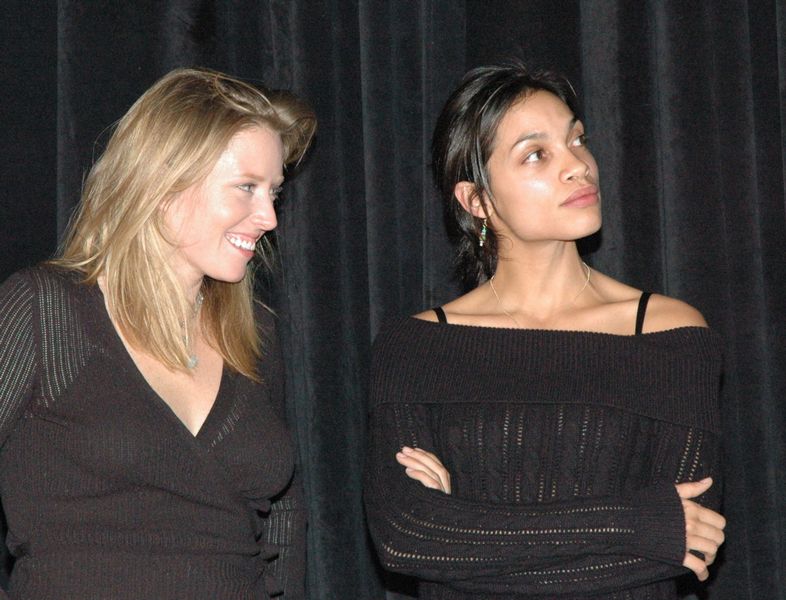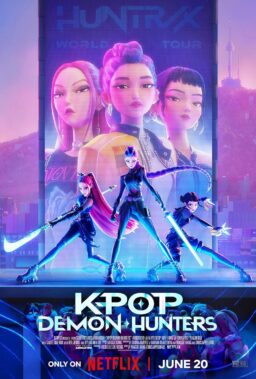PARK CITY, Utah — Rosario Dawson should be on those Sunday morning political talk shows, as a guest or a host, either way. She is so intelligent and fiercely opinionated that I forgot, for a moment, I was talking with a movie actress, and got into my Problems of the World mode.
Most people know her as The Rock’s tough, muscular co-star in “The Rundown,” or as a woman in black in “Men In Black II,” or as the fiery Roxanne, who takes the lead with Colin Farrell in “Alexander,” and turns their wedding night into a form of martial arts. They haven’t seen the Rosario Dawson who reads a poem in Ethan Hawke’s “Chelsea Walls,” or plays the possessive girlfriend in Spike Lee‘s “He Got Game,” or is the competitive journalist in “Shattered Glass.”
Now here she is at Sundance in Stephen Marshall’s “This Revolution,” starring as a New York woman whose husband was killed in Iraq, and who has joined a group organizing protests at the 2004 Republican National Convention. Movies are wonderful, in the way they can take us from Roxanne the sensuous dancer and voluptuous bedmate of Alexander the Great, to Tina Santiago, with blonde cornrows and a wardrobe from the Gap.
“You’re not at all protective of yourself in this role,” I said. “You’re a beautiful woman, but here you don’t do anything much with hair or makeup or clothes; you look kind of scruffy sometimes.”
“I like to play lots of different characters, not just the same thing again and again,” she said, “and I follow the character to who she is.”
The movie is a deliberate homage to Haskell Wexler‘s “Medium Cool,” the famous blend of fact and fiction set during the protests at the 1968 Democratic National Convention in Chicago. Again this time, the central relationship is between a news cameraman (Nathan Crooker) and a woman he meets on a story. Tina has lost her husband, is raising the outspoken young Richie (Brett DelBuono), and has become radicalized by what she sees as her husband’s needless death in Iraq. The cameraman is having an affair with his boss, played by Amy Redford, daughter of festival founder Robert; they differ on politics, and he finds himself attracted to the angry, grieving widow and her lovable son.
Even small details are parallels from the earlier film, including the pigeons the boy raises on the roof of his tenement. And Marshall repeats one of Wexler’s most daring gambits, which was to plug his fictional actors directly into real events. In “Medium Cool,” the cameraman (Robert Forster) and the woman (Verna Bloom) are in Grant Park when police fire tear gas at demonstrators. We can hear the famous off-screen line, “Look out, Haskell, it’s real!”
Here Dawson and her co-stars joined the real protests during the RNC, followed by cameramen who looked, of course, just like the real news cameramen. (Crooker in real life makes documentaries, so could shoot his character’s own footage.) So effectively did this work that Dawson was actually arrested, handcuffed, and held in jail for nine hours before convincing the police she was an actress playing an activist.
“It wasn’t that bad for me, compared to the real people I was locked up with,” she said. “You got the idea that the city and the Republicans equated dissent with treason. That’s not the American way.”
The story of Dawson’s discovery rivals the story about Lana Turner on the stool in the soda fountain. Dawson was sitting on the front stoop of her house one day when Larry Clark and Harmony Korine, the director and writer of “Kids” (1995) saw her. “I wrote this part just for you!” Korine said. “Although I didn’t know that until I saw you!” Many careers were started by that film, including Chloe Sevigny’s, but Dawson has achieved the most.
“I never set out to be in the movies,” she said. “One thing just followed another. My parents were very supportive. I never took any acting lessons or anything like that; I learned by doing it.”
Although she could work exclusively as a toned and sexy action heroine, she chooses her roles all over the map, and is as quick to work for almost nothing in “This Revolution” as for millions in “Alexander.”
“I was all set to be in Spike Lee‘s ‘She Hate Me,’ and then the start date was pushed back,” she said. “Oliver Stone offered me the role in ‘Alexander,’ and I took it. Spike was sooooo mad! He said, ‘You can be in a movie like that any day!’ I said, no, I couldn’t. How many epics are there? We shot for six months, in Morocco, England, all over. It was a great professional experience.”
Her character in “This Revolution” differs from the Verna Bloom character in “Medium Cool” in being political, radical, and vocal. She delivers one of the movie’s key speeches, articulating the argument against Bush and the war in Iraq. Apart from what she says, we sense that she understands and believes it, and is generating it. Some actors are hopeless with political speeches, obviously only delivering the dialogue. With Dawson’s Tina, we feel she’s speaking spontaneously. Given that the movie was shot in 11 days on a budget of approximately zero, that may even have been the case.
The movie is outspoken about manipulation of the media; the cameraman discovers that his raw footage of street demonstrators is being turned over to Homeland Security investigators, which is a breach of journalistic ethics. His form of revenge is unlikely but dramatic.
Rosario Dawson flew in to Sundance Wednesday morning and was out again Thursday, back to the preparations for her current movie, Chris Columbus‘s “Rent,” where she plays the lead, Mimi. “I sing and dance,” she said. “I like physical stuff. I don’t work out a lot per se, but I’m very active physically — running, scuba diving, climbing.”
I began by saying she could work as a political commentator. As we spoke, she developed a sophisticated vision of the connection between movies and politics, between image and policy. I have it all on tape. There’s not room for it in this daily festival report, but I’m going to get back to Rosario Dawson and her ideas. If it doesn’t work in the paper, maybe I can submit it to The Nation.












